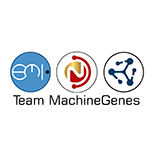
MachineGenes
About Us
Team MachineGenes is composed of three Australian tech start-ups, just coming out of stealth mode: Evolving Machine Intelligence, Diabetes Neuromathix and Turbine MachineGenes. All three companies share novel, proprietary forms of evolutionary machine learning (ML) and AI developed by the team leader, mathematician Dr Nigel Greenwood.
We believe that the current globally-dominant forms of ML and AI, predicated on artificial neural networks, are not the most effective path forward for machine intelligence.
In particular we are demonstrating how a completely different paradigm for ML, inspired by evolutionary ecosystems instead of neural processes, can create epistemological knowledge: which means the machine 'knows' what it knows, enabling much more efficient, explainable AI decision-making, able to generate good strategies despite having training data that is entirely a history of failures.
Our motivation is to use this platform to demonstrate the world's first genuinely machine-intelligent artificial pancreas suitable for the people who need it most: people with 'brittle' type-1 diabetes, who suffer huge swings in unstable blood glucose dynamics on a daily basis; who desperately need help in dosing their insulin levels; whose insulin-glucose dynamics are highly individual and complex; and whose medical histories are entirely a history of therapeutic failures.
These people desperately need medical AI to help them, but a new kind of AI: explainable, interactive and high-confidence, instead of 'black box'. So we've built it.
TECH INFORMATION
Our machine learning is inspired by evolutionary ecosystem dynamics: mutation, breeding, predation, migration, complex behavior and multi-population dynamics. Using genetic algorithms (GAs) as a starting-point, we have vastly increased the multi-scale complexity of the computational evolutionary process, and introduced a concept we call phi-texturing. This overcomes the stagnation problem that typically prevents GAs from being used for real-world complex systems with noise-polluted partial information; see our patents for further explanation. The net result is a new form of machine learning, appropriate for dynamical systems of known or guessable structure that generate partial time-series measurements from sensors, in which the resulting knowledge set generated by the ML is completely explicit, and hence explainable/auditable.
Our approach takes the explicit algebraic equations of insulin-medicated type-1 diabetes, and encodes models built on these equations as 'chromosomes'. These chromosomes are then forced to evolve (quite literally) across thousands of generations to match the dynamics observed in individual medical histories, so explicit 'digital twins' of the patient are evolved.
These models are then passed to adversarial AIs that use differential game theory: the first, 'Prime', AI uses the models to generate an insulin control strategy; then the second, 'Adversary', AI attempts to substitute an alternative model for which the control strategy has an adverse outcome, then the first AI endeavors to overcome this by modifying the strategy. The net result is a highly robust, stable insulin strategy for steering the blood glucose to desired outcomes, that can be modified interactively in real time by the user. This is personalized precision medicine using novel ML/AI.